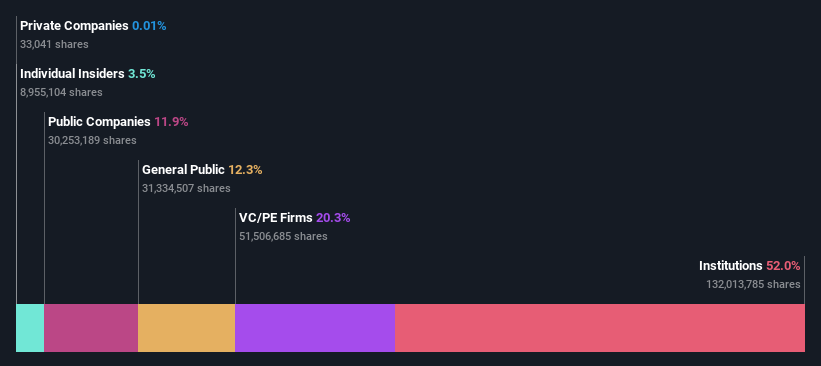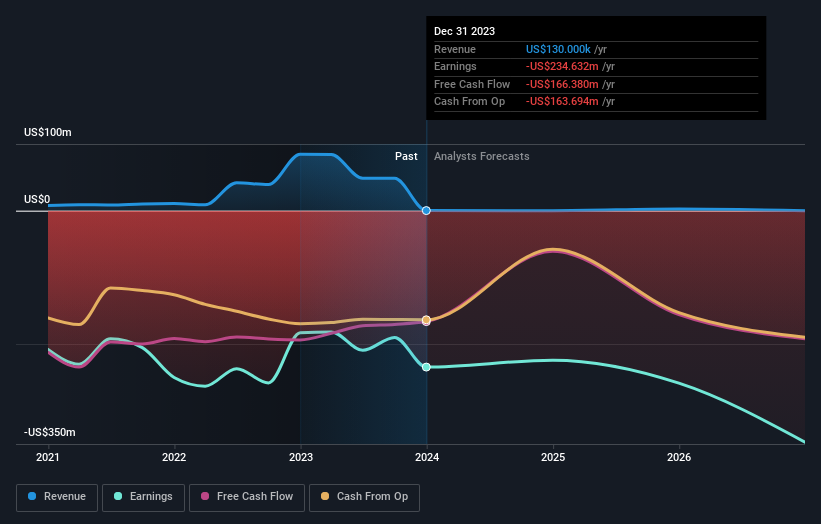- United States
- /
- Biotech
- /
- NasdaqGS:LYEL
Great week for Lyell Immunopharma, Inc. (NASDAQ:LYEL) institutional investors after losing 5.5% over the previous year

Key Insights
- Significantly high institutional ownership implies Lyell Immunopharma's stock price is sensitive to their trading actions
- A total of 6 investors have a majority stake in the company with 52% ownership
- Analyst forecasts along with ownership data serve to give a strong idea about prospects for a business
A look at the shareholders of Lyell Immunopharma, Inc. (NASDAQ:LYEL) can tell us which group is most powerful. We can see that institutions own the lion's share in the company with 52% ownership. In other words, the group stands to gain the most (or lose the most) from their investment into the company.
Last week's US$53m market cap gain would probably be appreciated by institutional investors, especially after a year of 5.5% losses.
Let's delve deeper into each type of owner of Lyell Immunopharma, beginning with the chart below.
See our latest analysis for Lyell Immunopharma

What Does The Institutional Ownership Tell Us About Lyell Immunopharma?
Institutional investors commonly compare their own returns to the returns of a commonly followed index. So they generally do consider buying larger companies that are included in the relevant benchmark index.
Lyell Immunopharma already has institutions on the share registry. Indeed, they own a respectable stake in the company. This implies the analysts working for those institutions have looked at the stock and they like it. But just like anyone else, they could be wrong. It is not uncommon to see a big share price drop if two large institutional investors try to sell out of a stock at the same time. So it is worth checking the past earnings trajectory of Lyell Immunopharma, (below). Of course, keep in mind that there are other factors to consider, too.

Investors should note that institutions actually own more than half the company, so they can collectively wield significant power. We note that hedge funds don't have a meaningful investment in Lyell Immunopharma. Arch Venture Partners, L.P. is currently the company's largest shareholder with 14% of shares outstanding. In comparison, the second and third largest shareholders hold about 12% and 7.9% of the stock.
We also observed that the top 6 shareholders account for more than half of the share register, with a few smaller shareholders to balance the interests of the larger ones to a certain extent.
While studying institutional ownership for a company can add value to your research, it is also a good practice to research analyst recommendations to get a deeper understand of a stock's expected performance. There are plenty of analysts covering the stock, so it might be worth seeing what they are forecasting, too.
Insider Ownership Of Lyell Immunopharma
The definition of an insider can differ slightly between different countries, but members of the board of directors always count. Company management run the business, but the CEO will answer to the board, even if he or she is a member of it.
Most consider insider ownership a positive because it can indicate the board is well aligned with other shareholders. However, on some occasions too much power is concentrated within this group.
We can see that insiders own shares in Lyell Immunopharma, Inc.. In their own names, insiders own US$27m worth of stock in the US$765m company. This shows at least some alignment. You can click here to see if those insiders have been buying or selling.
General Public Ownership
With a 12% ownership, the general public, mostly comprising of individual investors, have some degree of sway over Lyell Immunopharma. While this group can't necessarily call the shots, it can certainly have a real influence on how the company is run.
Private Equity Ownership
Private equity firms hold a 20% stake in Lyell Immunopharma. This suggests they can be influential in key policy decisions. Some investors might be encouraged by this, since private equity are sometimes able to encourage strategies that help the market see the value in the company. Alternatively, those holders might be exiting the investment after taking it public.
Public Company Ownership
Public companies currently own 12% of Lyell Immunopharma stock. This may be a strategic interest and the two companies may have related business interests. It could be that they have de-merged. This holding is probably worth investigating further.
Next Steps:
It's always worth thinking about the different groups who own shares in a company. But to understand Lyell Immunopharma better, we need to consider many other factors. Take risks for example - Lyell Immunopharma has 4 warning signs (and 2 which shouldn't be ignored) we think you should know about.
If you are like me, you may want to think about whether this company will grow or shrink. Luckily, you can check this free report showing analyst forecasts for its future.
NB: Figures in this article are calculated using data from the last twelve months, which refer to the 12-month period ending on the last date of the month the financial statement is dated. This may not be consistent with full year annual report figures.
New: AI Stock Screener & Alerts
Our new AI Stock Screener scans the market every day to uncover opportunities.
• Dividend Powerhouses (3%+ Yield)
• Undervalued Small Caps with Insider Buying
• High growth Tech and AI Companies
Or build your own from over 50 metrics.
Have feedback on this article? Concerned about the content? Get in touch with us directly. Alternatively, email editorial-team (at) simplywallst.com.
This article by Simply Wall St is general in nature. We provide commentary based on historical data and analyst forecasts only using an unbiased methodology and our articles are not intended to be financial advice. It does not constitute a recommendation to buy or sell any stock, and does not take account of your objectives, or your financial situation. We aim to bring you long-term focused analysis driven by fundamental data. Note that our analysis may not factor in the latest price-sensitive company announcements or qualitative material. Simply Wall St has no position in any stocks mentioned.
About NasdaqGS:LYEL
Lyell Immunopharma
A clinical-stage cell therapy company, develops T cell reprogramming technologies for patients with solid tumors.
Flawless balance sheet moderate.


